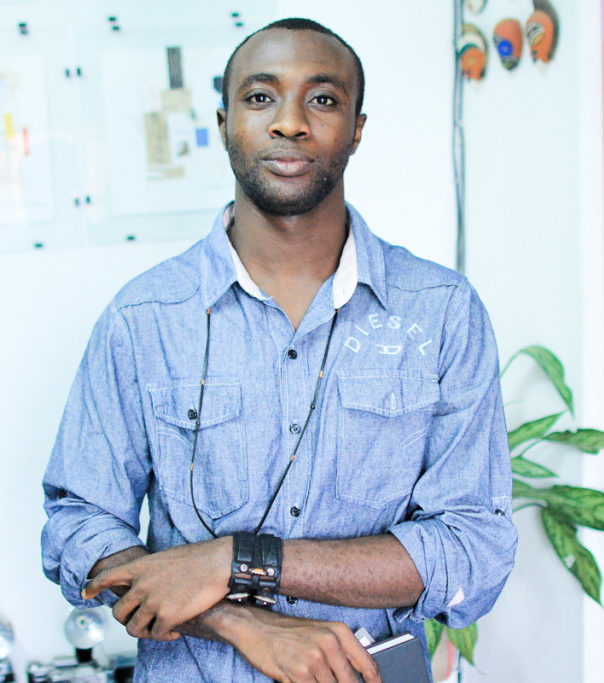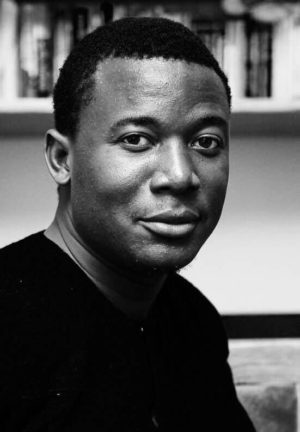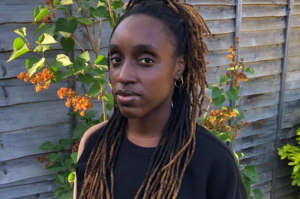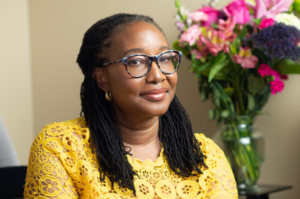
Emmanuel Iduma is the author of two books, Farad/A Sound of Things to Come (2012) and A Stranger’s Pose (2018). He is also the co-founder of Saraba Magazine, and a teacher at the MFA Art Writing Program, School of Visual Arts, New York City. I caught up with him over several weeks to discuss his latest book, which has got rave reviews in the Atlantic which describes it as humming “with a kind of gorgeous melancholy… part travelogue, part memoir, part poetry collection, part photo essay culled from Iduma’s own work and that of other visual artists.”
Kọlá Túbọ̀sún
Your book, A Stranger’s Pose, was published last year and has now been nominated for the 2019 Ondaatje Prize. Congratulations. It’s a long way from blog posts, dispatches, and travel writing fragments for KTravula a few years ago.
Emmanuel Iduma
Thank you very much. I’m actually more inclined to calling it a book of “dispatches” and “travel writing fragments.” But, as you know, the essay is essentially an attempt, a form that lends itself to attempts. And I’d be remiss not to thank you for providing access to KTravula, which was a real gift in my early months in Lagos, when I needed opportunities that proved that the struggle was worth it.
Kọlá Túbọ̀sún
I’ve read some of those blog dispatches again and seen what one could call the early intimations of a book in progress. At the time though, it was just a way to document a moment? How did it help the “struggle”, to use your words?
Emmanuel Iduma
I was struggling with form. I was only beginning to write nonfiction, drawing from my experience of place. Lagos was good for this, and you didn’t restrict my form, or subject matter.
Kọlá Túbọ̀sún
Have you always hoped to write a travel book? I assume that the inspiration from travelling itself can be a motivating impetus to write.
Emmanuel Iduma
I didn’t think I was writing a travel book until I was nearly done with a first draft, to be honest. I mean a “travel book” in the terms of genre, and as a marketing prompt—I accept the designation, for sure. But when I was setting out it was really an endeavor in reconciling art with experience, and the experience I’d had was that of traveling with artists.
Kọlá Túbọ̀sún
I’ve stumbled upon a conversation I had with you in 2016 about this same subject, while you were traveling with the Invisible Borders project whose trips form the background of your book. The question was whether you were fully transitioning to become a travel writer, and you said “I have not yet considered the idea of working in mainstream travel writing. I haven’t been able to match my ambition for my travel recollections with the form of more traditional travel writing. In my recent writing, especially after the road trips, the way I remember the journeys is not linear. There’s no narrative arc. It’s like a dog sniffing a field.”
What changed or what aided that transition, if you think one has happened?
Emmanuel Iduma
The transition between that conversation and this is, to be a little reductive, the final form of the book. Getting too precious about what “mainstream travel writing” might mean, especially in light of what the book does differently from other travel books, might not take us very far.
Kọlá Túbọ̀sún
Do you now consider yourself a travel writer? And what does that responsibility entail?
Emmanuel Iduma
I’m a writer, in the foremost, and most important sense. For this book, I was a writer who had a travel experience, and felt inclined to reconstruct some of those experiences. The responsibility would differ if, for instance, I spent months with a fishing community, writing of only one place. In this instance, I was holding up my experience in the light of photography, memory, and grief, hoping to be true to myself.
Kọlá Túbọ̀sún
The choice of Teju Cole to write the foreword is not that much of a curious choice, knowing his own involvement in travel writing (Every Day is for the Thief, Open City), art criticism, and his residence in New York where you are now currently based. But did you draw any other inspiration from his example when you decided to write the book? If so, I’m interested in hearing them as well as where you think there is divergence in both your work and outlook to literature as a bearer of the human condition.
Emmanuel Iduma
His example was luminous—not in those two earlier books, but, in fact, in the more recent Blind Spot, which is more or less a pairing of photographs and stories about place. However, that book came out after I’d written mine, and so it felt more like an acknowledgment of the space he was clearing for me. I remember feeling after I saw it that, yes, my book could exist in the world after his.
I stay away from the idea of divergence. I’m more interested in the terms of our kinship and connection, rather than those of comparison or evaluation. The mistake would be to compare us in terms of age or renown. That’s a little trite, and I perceive he’ll agree. When you look superficially we emerge from different intellectual traditions, if I can call it that—we were trained differently, he as an art historian, and I as a lawyer. On a subliminal level, the similarity to be reckoned with in our interests is far more broader than whether or not he influences me. I read him closely, and consider his work a lodestar to mine, and that could be reckoned with as influence. I think more in terms of convergence—already apparent in his foreword to the book—than divergence.
Kọlá Túbọ̀sún
There is a criticism I have often heard — and, sometimes levied myself — that African writers who live/lived in Western societies haven’t done enough to write (nonfiction) about those places, and themselves in it, in an authentic, open and truthful way. That we are more content to write in deferential terms, but turn the critical eye only when we write about our own environments back home. Is this a fair criticism or are things already as they should be?
Emmanuel Iduma
I don’t think that’s a fair criticism. Particularly because it is ineffectual to make such a neat distinction between what kind of writing is produced by African writers who live in the West. In fact, I’m now inclined to treat the “West” as a kind of category error. Not merely because mobility, especially amongst writers, makes that category fluid, but also because I believe all writers must approach writing about place with as much freedom and idiosyncrasy as they can muster. I mean, when I first looked at Edwardsville by Heart, it was clear that you weren’t interested in authenticity or criticality, in the strict sense. But to interpret and reconstruct travel through poetry.
When you levied this criticism yourself, what were your reasons for doing so?
Kọlá Túbọ̀sún
Before I wrote my own book, I was looking around for people like me who have captured what it is like to live in a different place, with honesty, in words and art. So I found America their America by JP Clark, which was famous only in its infamy and scarcity, with plenty chatter surrounding what furore it caused when it was published but little about its breathtaking artistic and literary achievement. There were a few others, scattered here and there (Buchi Emecheta, Ọlábísí Àjàlá, but very few overall by Nigerian or African writers—I’m thinking Ngugi, Achebe, Soyinka, to a lesser extent, etc). We seemed content to preserve the space to be safe in those places by not being as critical as we are of, say, our own homelands.
Is what you found curious the idea that I was looking for people like me rather than people, or writers, in general?
Emmanuel Iduma
I think you are right to seek out literary forebears, and I do agree that, depending on the kind of book one envisages, there might be few Nigerian or African writers who have worked in a similar manner. However we relate to our forebears or peers, I’m conscious of the kind of work we have to do, in Nigerian literature, for the sake of writers yet to be born.
Kọlá Túbọ̀sún
Speaking of my book Edwardsville by Heart, which was written about my time in the American Midwest. I find an interesting symbolism in the idea that most of the work was written while I lived in Lagos, far away in time and space from the scene of the action/memories/encounters, while your own book was written in New York about places in Africa. Following up on the previous question, is it then the case that we are usually more nostalgic/critical about places in which our bodies no longer reside than in the environments that currently sustain us?
Emmanuel Iduma
My book wasn’t written entirely in New York—but also in Rabat, Lagos, Dakar, Sinthian, and in several other cities in America. In fact, part of the method I practiced while writing, especially after the first third of the book had been written, was to transcribe an experience as soon as it had occurred, wherever I was. However, you’re asking a broader question. At some point I was eager to say, yes, a place is illuminated in and by absence. I’m not sure anymore. I sometimes feel nostalgia about Lagos while being in it, and maybe this is because each time I’ve been there in the last five years departure has been imminent. What seems most interesting to me now is how to work with the obscurity of a given moment, place, or event. How to write within, how to write critically about an unfolding event, how to write about a place as a backdrop, while being in it.
Kọlá Túbọ̀sún
Do you have an audience in mind when you write? If so, who are they and what do they do?
Emmanuel Iduma
I like this version of the question: what does my ideal audience do? I’m not sure if you mean this in terms of occupation or demographic. I really don’t know. I never want to make the mistake of confusing how the text should be written with who the reader might become. These are two stages in a process, and I simply cannot tell how long it would take for the reader to engage with the text. All I know are my ambitions for the text, how much ground I want to cover on a daily basis. And so, if the book is really going well, I do not know my intentions on a grand scale, only on a particular level. Intention, as Hilary Mantel was right to point out, evolves as a result of capacity. If I can get my capacity and ambitions right on a line-by-line basis, the ideal reader, or audience, would emerge. And since I suspect we are speaking in a Nigerian context, I am placing my bet that my aspirations can cater to Nigerians, wherever they may be, or whoever they are.
Kọlá Túbọ̀sún
What books were you reading, or what types of music were you listening to; what kind of art were you consuming while you were working on the book? And how long did it take to complete?
Emmanuel Iduma
There were, broadly speaking, two kinds of books – those in which images were incorporated into text, and books written in fragments. In that first category I was quite inspired by Aleksander Hemon’s The Lazarus Project, Carole Maso’s The Art Lover, W. G. Sebald’s Rings of Saturn, amongst a host of others. In the second category, I was indebted to Lydia Davis’ Collected Stories, Michael Ondaatje’s Running in the Family, Jennifer Clement’s Widow Basquiat, John Berger’s From A to X, and several more. The photographs I include in the book—all the photographers whose work are featured—were real enablers of the project. In the early days of writing I thought a lot about Yto Barrada’s The Strait Project, hoping it would guide me as I wrote about migration. In the latter days, I was moved deeply by John Akomfrah’s films—he’s a supreme essayist, second only in my mind to Chris Marker’s work, especially Sans Soleil. The music I have written about for The Quietus.
About your book, who were you in conversation with?
Kọlá Túbọ̀sún
Eugene B. Redmond’s passion and ambition greatly influenced my intention and realization of the book. He is the poet laureate of St. Louis and author of several books, whom I met first in 2002 at the University of Ibadan and later in Edwardsville. His passion for documenting spaces and people and memories bit me and never let go. His collection of photos and other historical records of African American and African multicultural arts movements (folklore, literature, poetry, history, dance, music, drama, politics, protest, culture, civil rights, etc) which he has carried for over sixty years, were recently acquired by Southern Illinois University Edwardsville. I thought of him often when I wrote. Then the aforementioned JP Clark, and Ọlábísí Àjàlá whose An African Abroad is a classic for African travel writing. I also owe George Bernard Shaw my insistence on making the foreword an important component of the overall narrative.
On readership, have you noticed any difference in how an African (or Nigerian) audience have received your book and how the Western one has? If so, how different/similar is their gaze or appreciation of what you’re trying to do?
Emmanuel Iduma
So far there’s been more reviews from publications in the United States. I suppose this is because I have mainly promoted it here. Yet, I’m keen with hope that the work speaks in rather dissimilar ways to people, whether they are based within or outside Nigeria. It is still too early to tell.
Your book was published in a similar manner, outside Nigeria, even though, I suppose, you are better known within. How have you been making a reach for an audience beyond the immediate locale?
Kọlá Túbọ̀sún
My initial challenge, from publishing a book with “Edwardsville” — a town in Illinois — in its title, was how to get a local population interested enough to want to engage with it. It wasn’t a worry as much as a curious interest in its outcome. Who feels more attached to it? Those from the environment where the writer emerged or those to whom the writer had fixed his literary gaze? So far, it has gotten interest from both; really from anyone who has had contact with it, so that is good.
So, looking at your writing today from when you wrote Farad/The Sound of Things to Come, what changes do you see? How much of it is conscious and how much has merely seeped into you from absorbing surrounding influences.
Emmanuel Iduma
The change has been real, even if unquantifiable. As writers we hope to match ambition with skill, and for each book, to sense the improvement of skill. When I was writing Farad I was swayed easily by the vagaries of the stories, by the tempting iconoclasm of the characters in my head. But for A Stranger’s Pose, and indeed for much of my narrative-driven work today, clarity is my goal. I want to set down the story or essay without dross.
The main change occurred during the two years I spent studying at the School of Visual Arts. My teachers were critics and writers who shunned jargon and encouraged the cultivation of a personal voice. Since I had already published a book when I got in, I had a number of opportunities while there, and immediately after, to use the toolkit I’d been given. One such opportunity was The Trans-African, the journal I managed for Invisible Borders. Writing those monthly essays on photography, I knew I had absorbed enough material on criticism to inform future work, especially with an eye trained on narrative.
Kọlá Túbọ̀sún
It’s a question all writer’s dread, but what is next after this? What are you working on, and what will we be talking about with you in ten years from now?
Emmanuel Iduma
My natural inclination in response to this question is to be taciturn, since I always seem to change my mind about what’s next. Yet I feel at liberty to say I’m working on three book projects, at different stages of progress. Two are nonfiction, one fiction, somewhat. All three continue in some way from where A Stranger’s Pose led, particularly considering my interest in the intimate encounter, and how, to paraphrase a line from a poem by Anne Michaels, one can pay attention not to how the personal is political, but how the political is inevitably personal.
In ten years I hope to have made two films.
End
___
About the Interviewer
 KT lives in Lagos, where he’s currently working on a nonfiction book. He’s the 2019 Miles Morland Writing Scholar.
KT lives in Lagos, where he’s currently working on a nonfiction book. He’s the 2019 Miles Morland Writing Scholar.









COMMENTS -
Reader Interactions